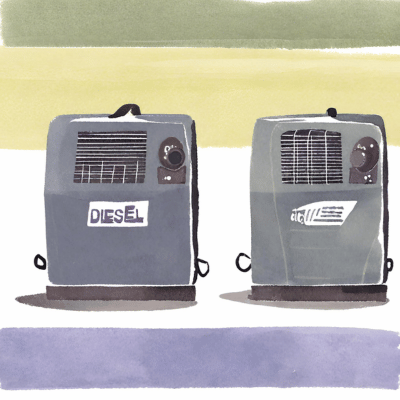In unserer modernen Welt, wo Strom eine fundamentale Rolle in fast allen Aspekten des täglichen Lebens spielt, ist die Bedeutung von Stromgeneratoren unbestreitbar. Ob für die Notstromversorgung bei Stromausfällen, zur Unterstützung von Freizeitaktivitäten im Freien oder als unverzichtbares Werkzeug auf Baustellen: Generatoren sorgen für Energie, wo und wann sie am meisten gebraucht wird. Doch welche Notstromaggregate bieten die höchste Leistung, die geringste Geräuschbelastung und den umweltfreundlichsten Kraftstoffverbrauch? Sind es Diesel- oder Benzin-Notstromaggregate? Kleine und handliche oder eher große, standortbezogene Stromaggregate?
Dieser Blogbeitrag bietet einen detaillierten Überblick über die verschiedenen Arten von Generatoren und deren Einsatzgebiete, um Ihnen zu helfen, die beste Wahl für Ihre spezifischen Bedürfnisse zu treffen.
Eine Vielfalt an Optionen: Die Palette von Stromaggregaten im Überblick
Im Allgemeinen wird bei Stromaggregaten zwischen folgenden Arten unterschieden:
- Benzin-Generatoren
- Diesel-Generatoren
- Gas-Generatoren
- Bi-Fuel-Generatoren
- Inverter-Generatoren
Bei der Nutzung von Notstromaggregaten unterscheidet man außerdem hauptsächlich zwischen zwei Typen: Standby-Generatoren und tragbare Notstromaggregaten. Standby-Generatoren sind feste Einrichtungen, die eine kontinuierliche Energieversorgung für Wohn- oder Geschäftsgebäude gewährleisten. Andererseits sind tragbare Notstromaggregate mobile Energiequellen, die sich besonders für vorübergehende Energiebedürfnisse wie Campingausflüge oder Outdoor-Veranstaltungen eignen.
Arten von Kraftstoffen für Stromgeneratoren – Gas, Diesel oder Benzin?
Die Wahl des Kraftstoffs für Ihr Notstromaggregat sollte nicht leichtfertig getroffen werden. Verfügbarkeit, Kosten, Umweltauswirkungen und Leistung sind wichtige Faktoren. Für seltene Nutzung oder mobile Anwendungen könnten Benzin- oder Gasgeneratoren ideal sein, während Dieselgeneratoren sich für häufigen oder intensiven Gebrauch besser eignen. Unabhängig vom gewählten Generator ist eine angemessene Wartung entscheidend für die Sicherheit und Langlebigkeit des Geräts. Regelmäßige Überprüfungen, sachgemäße Lagerung des Kraftstoffs und die Beachtung von Sicherheitsvorkehrungen sind unerlässlich.
Diesel-, Benzin- und Gasgeneratoren: Ein Überblick
Jeder Kraftstofftyp hat seine eigenen Vor- und Nachteile, die je nach Anwendungsbereich und Verfügbarkeit variieren.
- Dieselgeneratoren sind für ihre Effizienz und Langlebigkeit bekannt, allerdings können sie in Wohngebieten aufgrund des Lärms und der Emissionen weniger geeignet sein.
- Benzingeneratoren sind weit verbreitet und bieten eine gute Balance zwischen Verfügbarkeit und Kosten, erfordern jedoch häufigere Wartung.
- Gasgeneratoren (Erdgas, Propan) gelten als umweltfreundlichere Optionen, die eine sauberere Verbrennung und oft auch eine kostengünstigere Betriebsweise ermöglichen.
- Bi-Fuel Generatoren können mit einer Kombination aus Diesel und einem anderen Kraftstoff betrieben werden, was Flexibilität in der Kraftstoffversorgung und potenzielle Kosteneinsparungen bietet.


Dieselgeneratoren
Vorteile
- Hohe Effizienz
- Lange Betriebsdauer
- Robustheit
Nachteile
- Höhere Emissionswerte
- Geräuschpegel
Verwendung
- Langzeitgebrauch
- Große Lasten
Effizienz
- Sehr effizient bei kontinuierlichem Betrieb
Benziner
Vorteile
- Weit verbreitet und leicht zugänglich
- kostengünstig
Nachteile
- Höherer Wartungs-aufwand
- Flüchtiger Kraftstoff
Verwendung
- Allgemeiner Gebrauch
- Kleinere Geräte
Effizienz
- Effizient für kurze Laufzeiten und geringere Lasten
Gasgeneratoren (Erdgas, Propan)
Vorteile
- Umweltfreundlich
- Oft günstiger im Betrieb
Nachteile
- Erfordert Gasanschluss oder
- Lagerung von Gasflaschen
Verwendung
- Haushalte und Betriebe mit Zugang zu Erdgas
- Umweltbewusste Nutzer
Effizienz
- oft hohe Effizienz abhängig von Gasart
Tragbar oder Standby?
Die Energie für unterwegs: Tragbare Generatoren im Fokus
Tragbare Generatoren sind kompakte, mobile Energiequellen, die leicht von einem Ort zum anderen transportiert werden können. Sie sind ideal für temporäre Energiebedürfnisse wie zum Beispiel Campingausflüge, Outdoor-Veranstaltungen oder als Backup-Stromquelle für zuhause. Dank ihrer handlichen Größe und Mobilität können Sie leichter mit auf Ausflüge genommen oder ans andere Ende des Grundstücks transportiert werden, um dort Geräte mit Strom zu versorgen. Trotz ihrer praktischen Vorteile ist es wichtig zu beachten, dass tragbare Generatoren sowohl ihre Vor- als auch ihre Nachteile haben.
☛ Für wen sind sie geeignet?
Vor- und Nachteile tragbarer Generatoren
Vorteile
- Flexibilität und Mobilität
- Keine aufwendige Installation erforderlich
- Kostengünstiger als Standby-Generatoren
Nachteile
- Begrenzte Leistungskapazität
- Regelmäßige Überwachung und manueller Betrieb notwendig
- Eher selten geräuscharm
Standby-Generatoren: Zuverlässige Stromquelle rund um die Uhr
☛ Für wen sind sie geeignet?
Vor- und Nachteile von Standby-Generatoren
Vorteile
- Automatische Einschaltung bei Stromausfall
- Höhere Leistungskapazität
- Weniger Betriebsaufwand
Nachteile
- Höhere Anschaffungs- und Installationskosten
- Erfordert regelmäßige Wartung durch Fachpersonal
- Nimmt mehr Platz ein
Vergleich zwischen tragbaren und Standby-Generatoren
Tragbare Generatoren
Standby-Generatoren
- Kosten: In der Anschaffung günstiger
- Installation: Keine feste Installation notwendig, sofort einsatzbereit
- Wartung: Einfachere Wartung, oft vom Benutzer durchführbar
- Einsatzbereich: Flexibel einsetzbar für temporäre Bedürfnisse
- Automatisierung: Manueller Start erforderlich
- Leistung: Begrenzte Leistungskapazität, geeignet für kleinere Lasten
- Lärmentwicklung: Kann laut sein, abhängig vom Modell und Standort
- Mobilität: Hoch, kann leicht transportiert werden
- Kosten: Höhere Anschaffungs- und Installationskosten
- Installation: Erfordert professionelle Installation
- Wartung: Einfachere Wartung, oft vom Benutzer durchführbar
- Einsatzbereich: Fest installiert für kontinuierlichen Betrieb
- Automatisierung: Automatischer Start bei Stromausfall möglich
- Leistung: Höhere Leistungskapazität, kann ganze Häuser oder Gebäude versorgen
- Lärmentwicklung: Oft leiser, insbesondere Modelle mit Schallschutz
- Mobilität: Keine, fest installiert
Für welches Notstromaggregat entscheiden Sie sich: Gas, Diesel oder Benzin?
Stromgeneratoren sind eine vielseitige und oft lebenswichtige Ergänzung für viele Szenarien – von der Notstromversorgung bis hin zur Energieversorgung bei Outdoor-Aktivitäten. Die richtige Wahl des Generators hängt von einer Vielzahl von Faktoren ab, einschließlich des Bedarfs, des Budgets und der bevorzugten Kraftstoffart. Wägen Sie die Vor- und Nachteile der jeweiligen Kraftstoffarten und Generatortypen ab, um herauszufinden, ob ein mobiler oder fest installierter Stromerzeuger, ob Gas, Diesel oder Benzin besser für Sie und Ihre Zwecke geeignet sind. Mit den Informationen aus diesem Leitfaden sind Sie gut gerüstet, um eine informierte Entscheidung zu treffen, die Ihren Bedürfnissen am besten entspricht.





